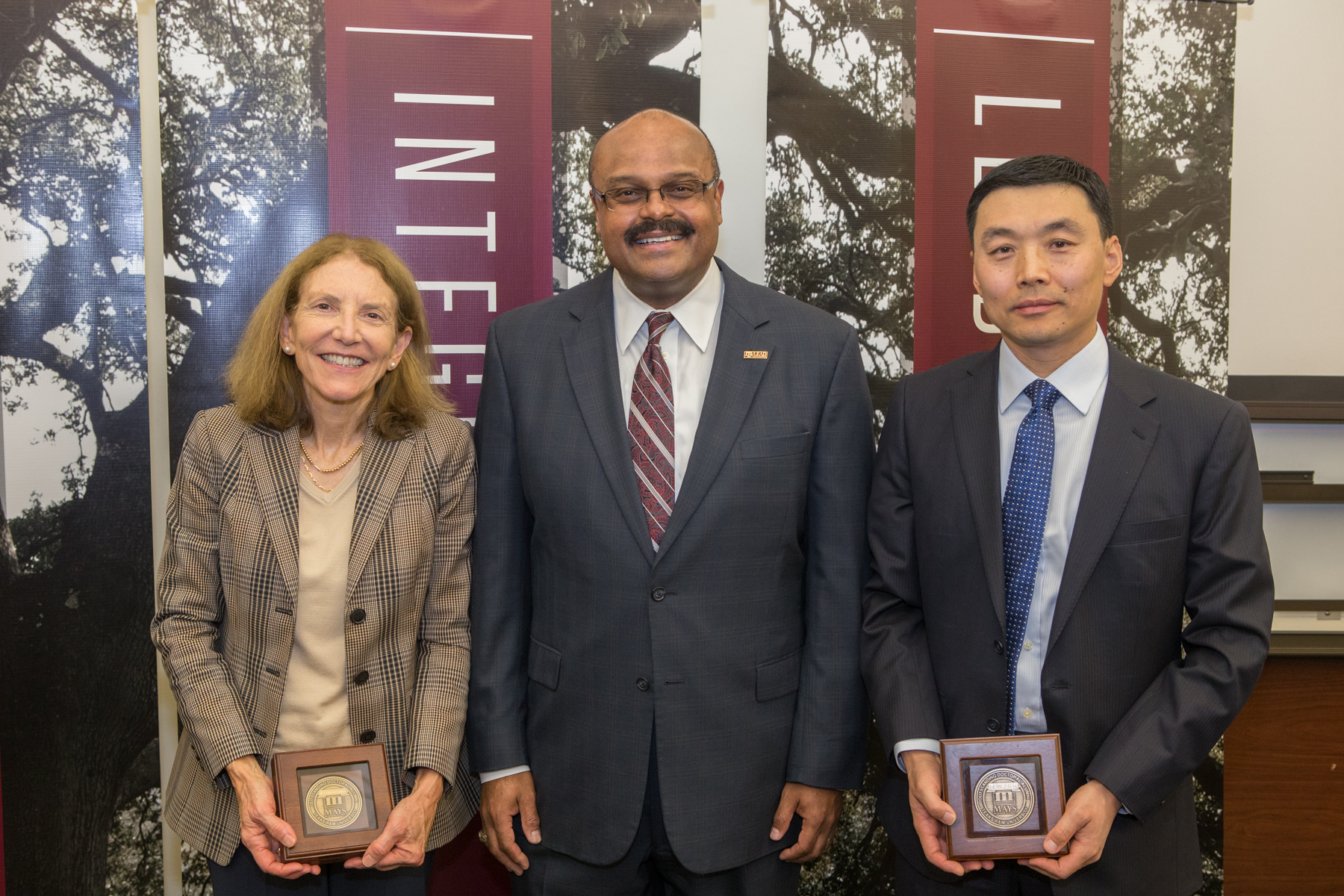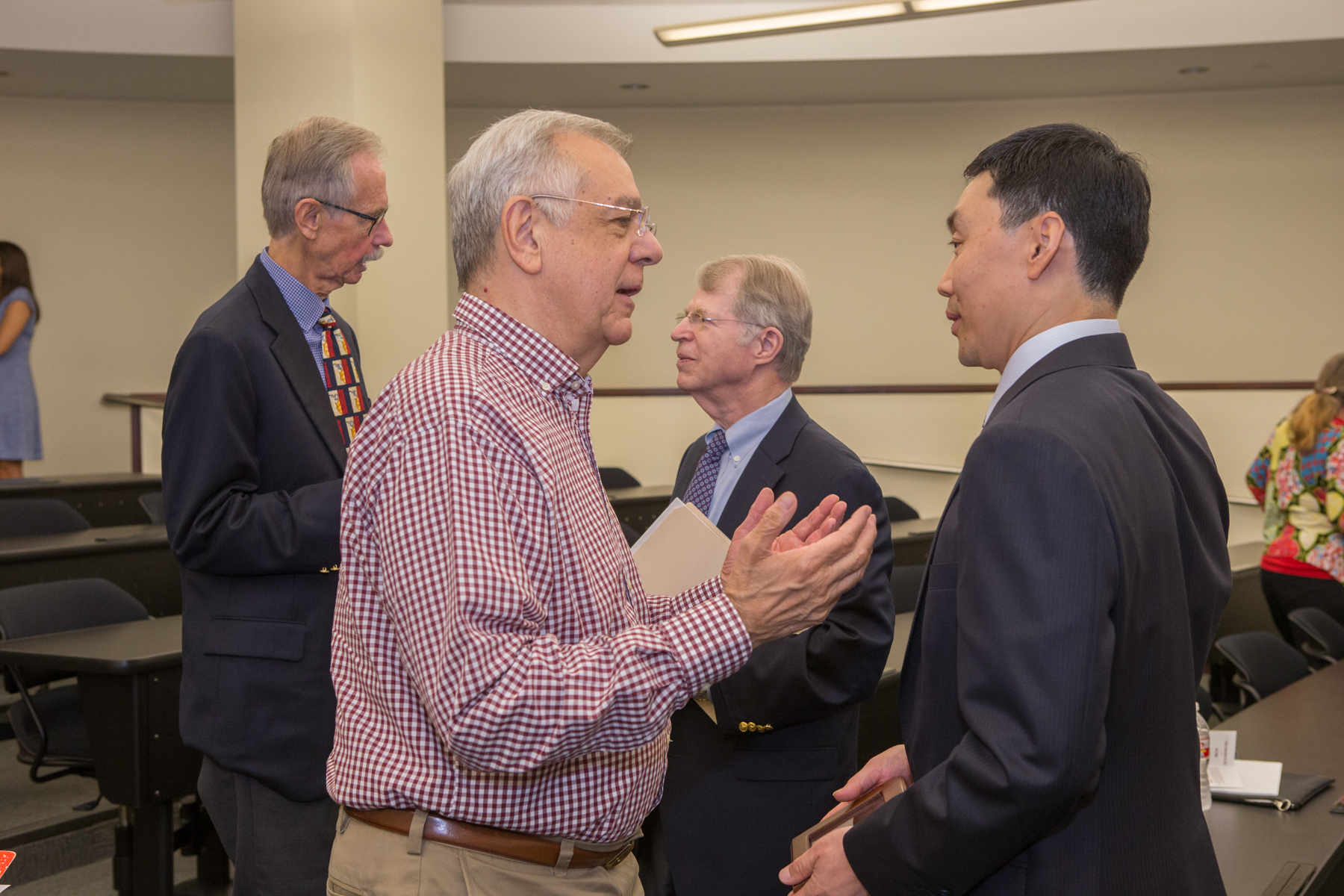Outstanding Doctoral Alumni Award recipients offer insights on successful academic careers
October 10, 2017
|
Dorian Martin
Texas A&M University’s Mays Business School recognized two graduates – Kathleen Seiders ’95 and Wei Shen ’99 – with the Outstanding Doctoral Alumni Award. This award highlights former students who have achieved significant distinction in their academic field. The pair were honored during an awards presentation and reception on September 29.
 “Kathleen and Wei are indicative of the high quality of individuals enrolled in our doctoral programs as well as the commitment that our faculty makes to help our students succeed,” said Mays Dean Eli Jones ’82, who received the honor in 2009. “Our doctoral candidates graduate with a deep knowledge of their subject area, a desire to expand the understanding in their field of research, and a commitment to educating future generations of students.”
“Kathleen and Wei are indicative of the high quality of individuals enrolled in our doctoral programs as well as the commitment that our faculty makes to help our students succeed,” said Mays Dean Eli Jones ’82, who received the honor in 2009. “Our doctoral candidates graduate with a deep knowledge of their subject area, a desire to expand the understanding in their field of research, and a commitment to educating future generations of students.”
Criteria for Mays’ Outstanding Doctoral Alumni include: sustained research productivity and visibility in the field; service to the profession as editor of a major scholarly journal; recipient of major awards for excellence in research, teaching and/or service; academic and administrative leadership; successful career progression at a peer or aspirational school; and holder of an endowed position.
Discovering their futures at Texas A&M
Both of the 2017 recipients faced daunting challenges upon entering Mays. For instance, Shen came to Texas A&M with limited knowledge of English. “At that time, I didn’t have to interview with an admissions committee, which was a benefit for me since my English was so poor,” said Shen, who is now the associate dean for China programs at Arizona State University’s W.P. Carey School of Business.
However, his language deficit proved challenging as Shen struggled in his classes. For instance, Shen, who earned a psychology degree from Peking University, initially didn’t understand the concept of strategy. Eventually he decided to focus his studies on how organizations function and used his background in psychology to take a different approach to his studies.
Coming from Beijing to College Station also was a shock. “I thought I would have a lot of opportunities to interact with the business world,” said Shen. “But when I got here, I wondered where the businesses were.”
Seiders enrolled in Texas A&M as a non-traditional student. “I realize now how lucky I was to be accepted to Texas A&M when I was an older student,” said the professor of marketing at Boston College’s Carroll School of Management. However, she was able to parlay her 10 years of experience in the food retailing industry along with her master’s degree from Babson College and a strong work ethic into a reputation for excellence as a student.

Seiders was greatly influenced by the productivity of Leonard Berry, University Distinguished Professor of Marketing. “He’s a really daunting mentor to follow,” she said. “Someday I’ll figure out how he has remained so productive in his research (throughout his long career).”
A difficult start in academia
After earning their doctorates, both former students faced early challenges in their academic careers. Seiders graduated in the midst of a tight job market. Instead of being able to return to her hometown of Austin, she joined Babson College and worked in the School for Executive Education, where she held the Constantine Simonides Term Chair and earned tenure.
However, Seiders found that she wasn’t happy at Babson so she gave up tenure in order to move to Boston College. She earned tenure at that institution and became a full professor five years later.
Seiders thrived at Boston College, where she focuses on researching customer convenience, retailing and service strategy, and public policy and food marketing. She serves on the editorial review boards of the Journal of Public Policy & Marketing and Journal of Service Research.
Time proved to be a challenge for Shen early in his career. He wanted to have regular conversations with colleagues who have similar research interests because those interactions help stimulate thinking. However, when Shen and his wife started creating a family, he had to think creatively about his time. For instance, he and another faculty member would take their children to play in the park and then use that time to talk about their research.
Shen and Seiders also learned to carefully select their collaborators because of the varying approaches to work quality and work ethic. “When you find someone who clicks with you, stay with them,” Seiders advised.
These relationships tend to have a profound influence on a scholar’s career. “The people who surround you really help you with research and becoming a better teacher and person,” said Shen, who serves on the editorial boards of the Academy of Management Review, Journal of Management and Governance, Management and Organization Review, and Strategic Management Journal. He previously served as senior research fellow at the SKOLKOVO Institute for Emerging Market Studies.
Sharing lessons learned
Both scholars offered suggestions regarding how to navigate an academic career to Mays doctoral students.
Seiders, who is the immediate past-president of the Academic Council of the American Marketing Association, finds maintaining a high-level academic career to be challenging. “It’s very difficult to have a successful career in publishing,” she said. Seiders works long days and weekends, and credits her resilience for keeping her going. Her tenacity has helped her to build a strong research record, which she described as a type of currency that allows a researcher to go anywhere.
Both Shen and Seiders encourage emerging scholars to be careful in their academic choices. For instance, Seiders experienced the frustration of working at a university with an organizational culture that didn’t match her work pattern. Shen also described a difficult fit when he faced the challenge of commuting in New Jersey during his time at Rutgers University.
The former students also believe that doctoral candidates should value working with students as much as doing research. “Many lose sight of that,” Seiders cautioned, noting that faculty who see themselves as educators ground their work in practice. The Boston College professor pointed out that even though producing academic research is foundational to building the knowledge base in an academic discipline, a relatively small number of people read a faculty member’s research. “Therefore, we have a better opportunity to extend our impact by focusing on students,” she said.
Shen and Seiders said they still greatly appreciate the amount of support that they received from Texas A&M’s faculty and believe this level of support is rare. “People do so much for you here,” Seiders said. “You learn to pay it forward.”


